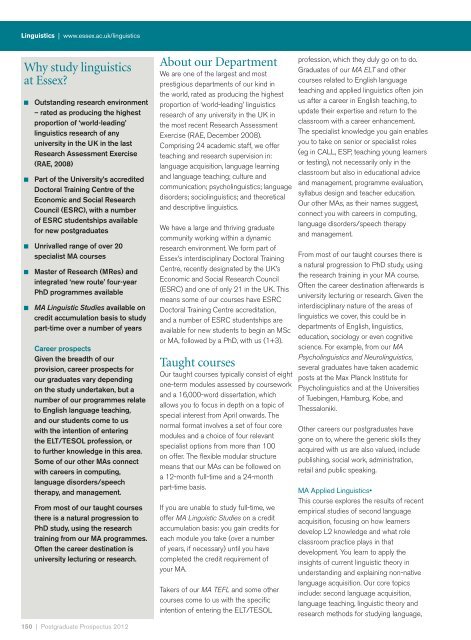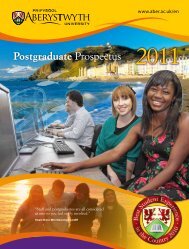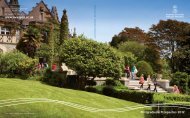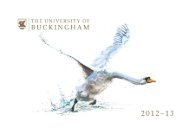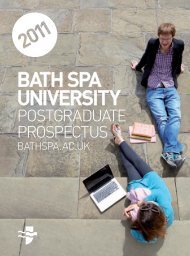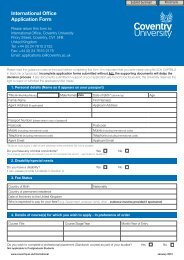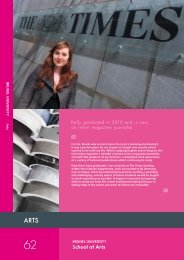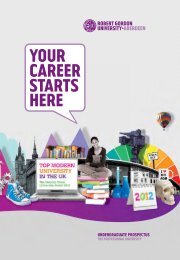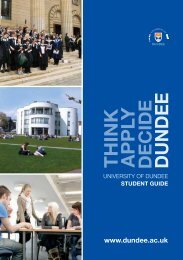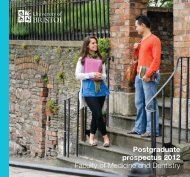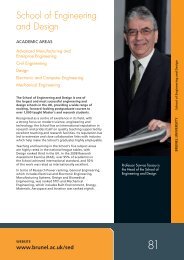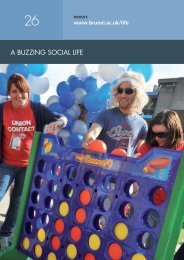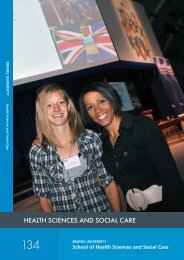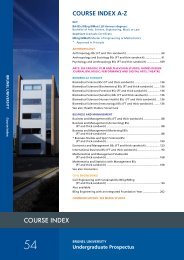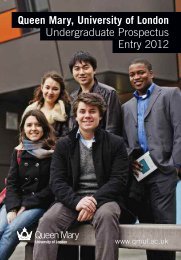Postgraduate Prospectus
Postgraduate Prospectus
Postgraduate Prospectus
Create successful ePaper yourself
Turn your PDF publications into a flip-book with our unique Google optimized e-Paper software.
Linguistics | www.essex.ac.uk/linguistics<br />
Why study linguistics<br />
at Essex?<br />
n<br />
n<br />
Outstanding research environment<br />
– rated as producing the highest<br />
proportion of ‘world-leading’<br />
linguistics research of any<br />
university in the UK in the last<br />
Research Assessment Exercise<br />
(RAE, 2008)<br />
Part of the University’s accredited<br />
Doctoral Training Centre of the<br />
Economic and Social Research<br />
Council (ESRC), with a number<br />
of ESRC studentships available<br />
for new postgraduates<br />
n Unrivalled range of over 20<br />
specialist MA courses<br />
n<br />
n<br />
Master of Research (MRes) and<br />
integrated ‘new route’ four-year<br />
PhD programmes available<br />
MA Linguistic Studies available on<br />
credit accumulation basis to study<br />
part-time over a number of years<br />
Career prospects<br />
Given the breadth of our<br />
provision, career prospects for<br />
our graduates vary depending<br />
on the study undertaken, but a<br />
number of our programmes relate<br />
to English language teaching,<br />
and our students come to us<br />
with the intention of entering<br />
the ELT/TESOL profession, or<br />
to further knowledge in this area.<br />
Some of our other MAs connect<br />
with careers in computing,<br />
language disorders/speech<br />
therapy, and management.<br />
From most of our taught courses<br />
there is a natural progression to<br />
PhD study, using the research<br />
training from our MA programmes.<br />
Often the career destination is<br />
university lecturing or research.<br />
150 | <strong>Postgraduate</strong> <strong>Prospectus</strong> 2012<br />
About our Department<br />
We are one of the largest and most<br />
prestigious departments of our kind in<br />
the world, rated as producing the highest<br />
proportion of ‘world-leading’ linguistics<br />
research of any university in the UK in<br />
the most recent Research Assessment<br />
Exercise (RAE, December 2008).<br />
Comprising 24 academic staff, we offer<br />
teaching and research supervision in:<br />
language acquisition, language learning<br />
and language teaching; culture and<br />
communication; psycholinguistics; language<br />
disorders; sociolinguistics; and theoretical<br />
and descriptive linguistics.<br />
We have a large and thriving graduate<br />
community working within a dynamic<br />
research environment. We form part of<br />
Essex’s interdisciplinary Doctoral Training<br />
Centre, recently designated by the UK’s<br />
Economic and Social Research Council<br />
(ESRC) and one of only 21 in the UK. This<br />
means some of our courses have ESRC<br />
Doctoral Training Centre accreditation,<br />
and a number of ESRC studentships are<br />
available for new students to begin an MSc<br />
or MA, followed by a PhD, with us (1+3).<br />
Taught courses<br />
Our taught courses typically consist of eight<br />
one-term modules assessed by coursework<br />
and a 16,000-word dissertation, which<br />
allows you to focus in depth on a topic of<br />
special interest from April onwards. The<br />
normal format involves a set of four core<br />
modules and a choice of four relevant<br />
specialist options from more than 100<br />
on offer. The flexible modular structure<br />
means that our MAs can be followed on<br />
a 12-month full-time and a 24-month<br />
part-time basis.<br />
If you are unable to study full-time, we<br />
offer MA Linguistic Studies on a credit<br />
accumulation basis: you gain credits for<br />
each module you take (over a number<br />
of years, if necessary) until you have<br />
completed the credit requirement of<br />
your MA.<br />
Takers of our MA TEFL and some other<br />
courses come to us with the specific<br />
intention of entering the ELT/TESOL<br />
profession, which they duly go on to do.<br />
Graduates of our MA ELT and other<br />
courses related to English language<br />
teaching and applied linguistics often join<br />
us after a career in English teaching, to<br />
update their expertise and return to the<br />
classroom with a career enhancement.<br />
The specialist knowledge you gain enables<br />
you to take on senior or specialist roles<br />
(eg in CALL, ESP, teaching young learners<br />
or testing), not necessarily only in the<br />
classroom but also in educational advice<br />
and management, programme evaluation,<br />
syllabus design and teacher education.<br />
Our other MAs, as their names suggest,<br />
connect you with careers in computing,<br />
language disorders/speech therapy<br />
and management.<br />
From most of our taught courses there is<br />
a natural progression to PhD study, using<br />
the research training in your MA course.<br />
Often the career destination afterwards is<br />
university lecturing or research. Given the<br />
interdisciplinary nature of the areas of<br />
linguistics we cover, this could be in<br />
departments of English, linguistics,<br />
education, sociology or even cognitive<br />
science. For example, from our MA<br />
Psycholinguistics and Neurolinguistics,<br />
several graduates have taken academic<br />
posts at the Max Planck Institute for<br />
Psycholinguistics and at the Universities<br />
of Tuebingen, Hamburg, Kobe, and<br />
Thessaloniki.<br />
Other careers our postgraduates have<br />
gone on to, where the generic skills they<br />
acquired with us are also valued, include<br />
publishing, social work, administration,<br />
retail and public speaking.<br />
MA Applied Linguistics•<br />
This course explores the results of recent<br />
empirical studies of second language<br />
acquisition, focusing on how learners<br />
develop L2 knowledge and what role<br />
classroom practice plays in that<br />
development. You learn to apply the<br />
insights of current linguistic theory in<br />
understanding and explaining non-native<br />
language acquisition. Our core topics<br />
include: second language acquisition,<br />
language teaching, linguistic theory and<br />
research methods for studying language,


